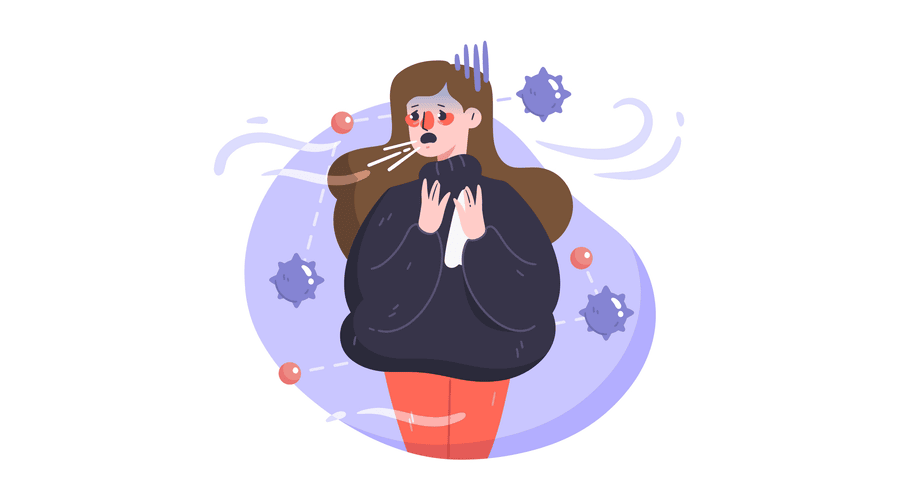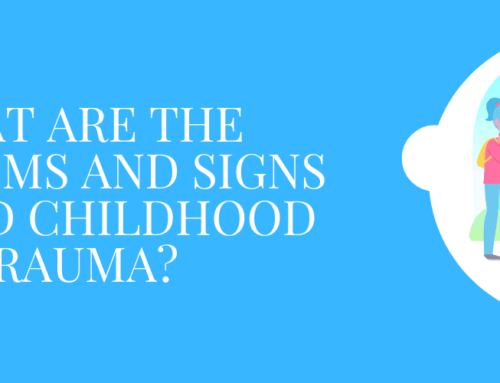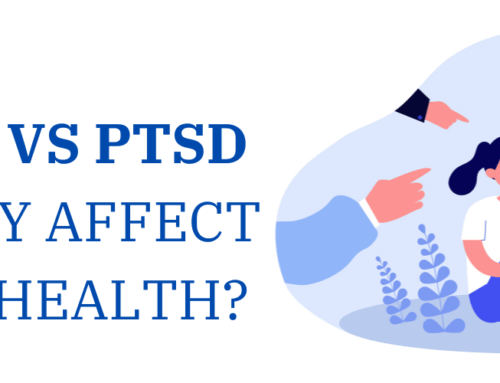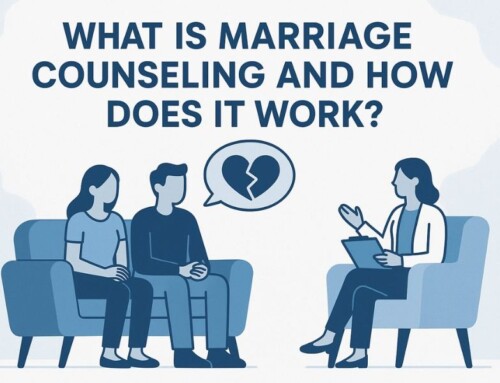How to Tell If Shortness of Breath Is a Symptom of Anxiety?
TL;DR
|
|---|
Struggling to breathe for no clear reason? It could be anxiety.
Shortness of breath is one of the most frightening symptoms of anxiety. It can hit out of nowhere. You feel like you can’t get enough air, even if your lungs are fine. You wonder if something is seriously wrong.
This guide will help you figure out if anxiety is the cause. We’ll explain what anxiety-related shortness of breath feels like, how to tell it apart from heart or lung issues, and what to do when it happens.
If you’re tired of guessing, start here.
How To Tell If Shortness of Breath Is From Anxiety Or Heart Problems?
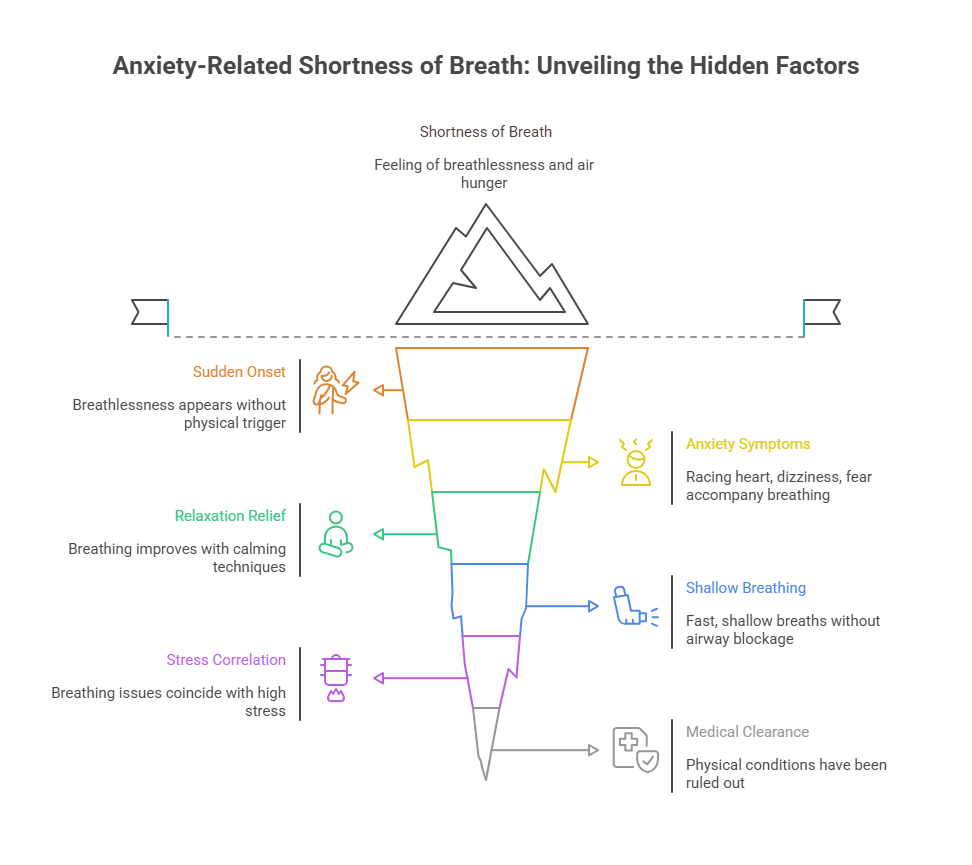
Are You Asking Yourself:
- How to tell if shortness of breath is from anxiety or asthma?
- How to tell if shortness of breath is from anxiety or lung problems?
- Can stress and anxiety cause shortness of breath?
If you’re struggling to breathe and aren’t sure why, you’re not alone.
Many people with anxiety experience physical symptoms that feel identical to asthma or lung issues. The difference often lies in the pattern: anxiety-related breathlessness tends to come on suddenly, without a clear physical trigger, and improves with relaxation. Asthma or lung problems, on the other hand, typically involve wheezing, mucus, coughing, or symptoms that worsen with exertion.
Knowing what to look for can help you breathe easier and make smarter decisions about when to seek help.
1. Does It Start Suddenly, Even When You’re Not Active?
Anxiety-related shortness of breath often comes out of nowhere. You could be sitting, resting, or lying down. There’s no physical trigger like exercise, just a sudden feeling of tightness or air hunger, which can be linked to an increased breathing rate.
Why this matters:
Shortness of breath caused by lung or heart conditions usually builds with effort or over time. Anxiety can trigger it in an instant.
2. Do You Feel Other Anxiety Symptoms Alongside It?
Think: racing heart, dizziness, shaking, chest pressure, or a rush of fear. These symptoms often show up together with anxiety-driven breathing trouble.
Why this matters:
Anxiety affects more than your breath. If multiple symptoms hit at once, your nervous system may be in fight-or-flight mode.
3. Does It Get Better When You Calm Down?
If your breathing improves with slow breaths, fresh air, or a short walk, anxiety is a likely cause.
Why this matters:
Physical breathing problems (like asthma or heart failure) don’t usually improve just because you shift your focus or relax.
4. Does Your Breathing Feel Fast and Shallow, Not Blocked?
With anxiety, it can feel like you’re breathing quickly but not deeply. You may sigh often or feel like you can’t get a full breath, but there’s no wheezing or chest congestion.
Why this matters:
Asthma or lung disease often involves airway blockage, mucus, or wheezing, not just air hunger.
5. Has It Happened During High Stress or Mental Overload?
If you’ve been under pressure, work, family, health concerns, and the breathing issue started around the same time, anxiety could be driving it.
Why this matters:
Stress builds up in the body. For many, the release point is the breath.
6. Have Doctors Ruled Out Physical Conditions?
If you’ve had normal results on heart, lung, or oxygen tests but still feel short of breath, anxiety may be what’s left regarding your physical health.
Why this matters:
Anxiety doesn’t show up on scans. But it’s real, physical, and needs the right support, not more guessing.
You’re Not “Overreacting.” Your Body Is Asking for Help.
We work with people every day who feel like they’re losing control of their breath. We help them regain it, step by step.
[Let’s take the next step together]
How Anxiety Causes Shortness of Breath?
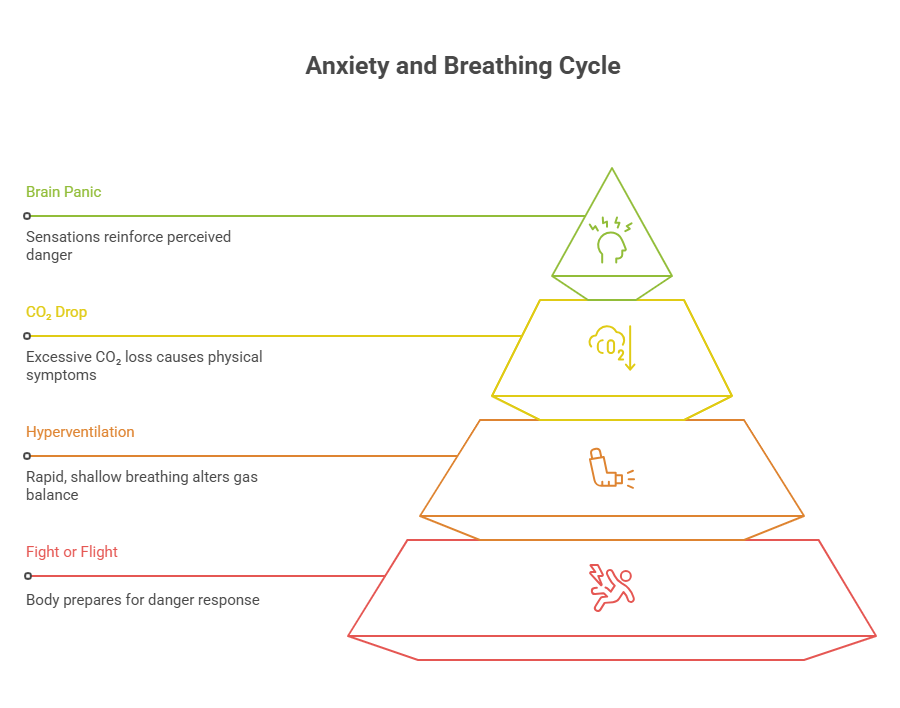
Anxiety doesn’t just affect your thoughts; it affects your body, especially your breathing. Here’s what’s really happening when anxiety makes it hard to breathe.
1. Your Body Enters Fight or Flight
When you’re anxious, your body thinks you’re in danger, even if you’re not. It prepares to fight or run by increasing your heart rate and breathing faster. This is automatic. You don’t choose it, your nervous system does.
2. You Start to Hyperventilate
Anxiety often makes you breathe too fast and too shallow. This rapid breathing, or hyperventilation, can cause you not to notice it at first, but it changes your oxygen and carbon dioxide balance. Practicing deep breathing can help counteract this effect.
3. Your CO₂ Levels Drop Too Low
When you over-breathe, your body blows off too much carbon dioxide. This causes symptoms like lightheadedness, tingling, chest tightness, and the feeling of not getting enough air, even though you’re breathing plenty.
4. Your Brain Thinks You’re Not Safe
The more these sensations grow, the more your brain believes something’s wrong. That panic makes your breathing worse and highlights the need for appropriate treatment. It becomes a loop, fear triggers symptoms, and the symptoms trigger more fear, highlighting the underlying cause of the anxiety.
Bottom line:
Yes, anxiety can absolutely cause shortness of breath, and understanding the process is the first step to breaking the cycle.
Also Read – 3 Things You Can Do If You Suspect Your Child Is Suffering From Anxiety and/or Depression.
Why Does Anxiety Cause Shortness of Breath Anxiety at Night?
Shortness of breath from anxiety doesn’t just hit during the day. For many, shortness of breath when lying down anxiety is worse at night, when your body is still but your mind is not.
Here are the two most alarming reasons that cause it.
1. Lying Down Can Make It Feel Worse
When you lie flat, your breathing changes. If you’re already anxious, you might become hyper-aware of every breath. The lack of distraction makes it easier to spiral.
2. Night Panic Is Real
Some people experience nocturnal panic attacks, sudden waves of anxiety that wake them up, heart pounding, gasping for air. They feel like emergencies, but often pass in minutes.
That might explain can anxiety cause shortness of breath, and for many, it does.
But what if your symptoms match, yet the reasons don’t feel right? Maybe you’re not stressed. Maybe the tight chest happens without warning. That’s why there’s always room for further verification.
Keep reading. It’s worth understanding what else could be going on.
When It’s Not Anxiety, What Else Could Be Causing It?
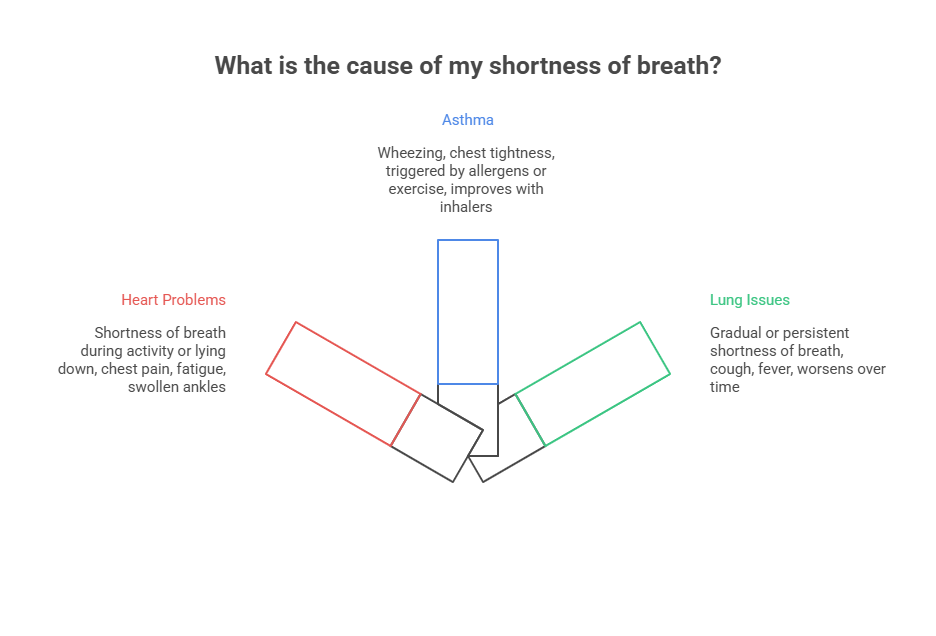
Not all shortness of breath is caused by anxiety. Sometimes, it’s a sign of an underlying physical condition that needs medical attention. Here’s how to tell the difference.
1. Heart Problems
- Shortness of breath during physical activity or when lying down
- Chest pain, pressure, or heaviness
- Fatigue, swollen ankles, or lightheadedness
- Often doesn’t improve with rest or breathing techniques
2. Asthma
- Wheezing, tightness in the chest
- Shortness of breath triggered by allergens, cold air, or exercise
- Coughing or mucus buildup
- Improves with inhalers or bronchodilators
3. Lung Issues (e.g., COPD, pneumonia)
- Gradual or persistent shortness of breath
- Ongoing cough, fever, or fatigue
- Often worsens over time or with exertion
- Linked to infections or chronic conditions
Also Read – Fox 35 ADHD Student: NPR Study shows ADHD Linked to Diet
Quick Comparison Checklist
|
Feature |
Anxiety | Heart Problem | Asthma | Lung Issue |
|---|---|---|---|---|
| Onset | Sudden, during rest or stress | During exertion or at night | With triggers like allergens | Gradual or infection-related |
| Other Symptoms | Racing heart, dizziness, panic | Chest pain, swelling, fatigue | Wheezing, cough, tight chest | Cough, fever, tiredness |
| Relief With Breathing Techniques | Often improves | Usually no effect | Needs medication | May not improve without treatment |
| Medical Evaluation | Often normal results | Abnormal ECG or heart tests | Confirmed via spirometry | Detected via scans or tests |
How to Stop Shortness of Breath From Anxiety?
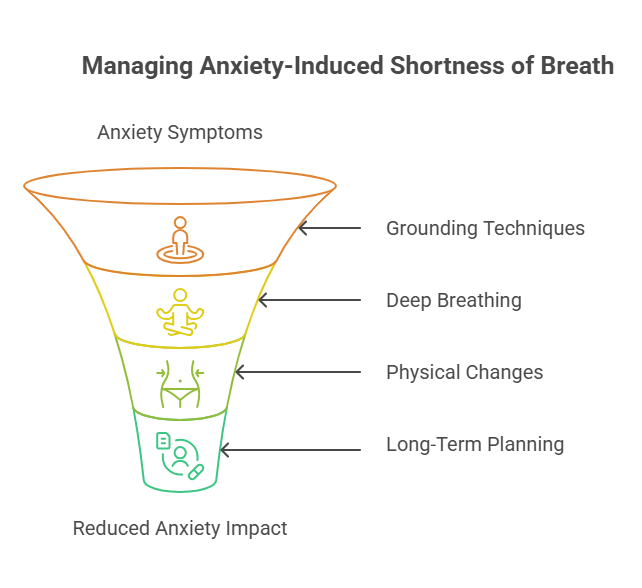
If your chest feels tight and you’re struggling to breathe, the first thing to know is this: you’re not in danger, even if your rib cage feels restricted. These self-care techniques can help you feel more in control, both in the moment and over time.
1. Try Grounding Techniques
An anxiety attack pulls your mind into the future. Grounding brings you back to the present.
- Name 5 things you can see, 4 you can touch, 3 you can hear, 2 you can smell, 1 you can taste
- Splash cold water on your face
- Press your feet into the ground and focus on the contact
These shift your attention from panic to physical reality.
2. Use Deep Belly Breathing (4-7-8 Method)
This deep breaths technique slows your breathing and resets your nervous system.
- Inhale for 4 seconds
- Hold for 7 seconds
- Exhale slowly for 8 seconds
Repeat for a few minutes until your breath evens out.
3. Change Your Space or Posture
Sometimes, the fastest relief is physical.
- Sit upright or prop yourself up with pillows
- Step outside for fresh air
- Unclench your jaw, relax your shoulders
These small shifts signal safety to your body.
4. Build a Long-Term Plan
Shortness of breath from anxiety may come back if the root cause isn’t addressed. These tools help reduce how often it happens:
- Cognitive Behavioral Therapy (CBT) to reframe fear-based thoughts
- Medication if symptoms are intense or constant
- Lifestyle changes like reducing caffeine, getting enough sleep, and regular movement
The goal isn’t to avoid the sensation, it’s to train your body not to fear it.
With the right tools, that tight chest and breathless feeling can lose its power over you.
Get the Support You Deserve With Total Life Counseling
Symptom of anxiety don’t always look like worry. Sometimes, it shows up in your body, in your breath, your chest, and your sleep. And when it does, you need more than tips. You need someone who understands both the physical and emotional side of what you’re going through.
At Total Life Counseling, we help you make sense of what you’re feeling and why. Our licensed mental health therapists work with clients every day who deal with shortness of breath, panic, and stress-related symptoms that feel overwhelming.
Whether you’re looking for practical coping tools, a full therapy plan, or just someone to talk to without judgment, we’re here.
You don’t have to manage this alone.
Schedule a session with a TLC therapist and take the first step toward real relief.
Conclusion
Shortness of breath can feel like a heart attack, but for many, it’s a sign of an anxiety disorder triggering the body’s flight response. These physical symptoms are real and treatable. With the right treatment options, including therapy, lifestyle changes, and relaxation techniques, you can learn to calm your breath and regain control.
If you’re struggling to tell the difference, don’t wait. Help is available, and healing starts with understanding what’s really going on.
Frequently Asked Questions
Can anxiety really cause shortness of breath?
Yes. Anxiety triggers your fight-or-flight response, leading to rapid, shallow breathing (hyperventilation), chest tightness, and the feeling of not getting enough air, even when your lungs and heart are fine.
How can I tell if it’s anxiety and not a heart attack?
Anxiety-induced breathlessness usually comes on suddenly at rest, peaks within 10–30 minutes, and improves with calm breathing. Heart attack symptoms often build gradually, include chest pressure that may radiate, and persist or worsen, especially with physical exertion.
Is shortness of breath a symptom of panic attacks?
Yes. Shortness of breath is one of the core symptoms of panic attacks, along with rapid heartbeat, sweating, dizziness, and a sense of impending doom. It typically peaks quickly and then subsides.
What’s the difference between anxiety-related shortness of breath and asthma?
With anxiety, breathing feels fast and shallow, and there’s no wheezing or mucus. Asthma usually comes with wheezing, chest tightness, coughing, and improves with bronchodilators.
Can anxiety cause you to wake up short of breath at night?
Absolutely. Nighttime or nocturnal panic attacks can wake you with sudden breathlessness and heightened anxiety. They often stem from stress, unresolved tension, or body awareness when lying down.
What can I do right now to ease shortness of breath from anxiety?
Try diaphragmatic or pursed-lip breathing: breathe slowly through your nose, fill your belly, exhale through pursed lips. Grounding techniques like 5-4-3-2-1 can also help. These methods are proven to slow breath and calm the nervous system effectively.
Filed in: Adults, Anxiety, Gemima McMahon
Share This Story, Choose Your Platform!
Total Life Counseling Center consists of Licensed Counselors, masters level therapists, Español counselors, Licensed Mental Health Counselors, business coaches, and image enhancement coaches who provide counseling for emotional, mental, physical and spiritual care including marriage, individual, family, substance abuse and more. TLC’s family, trauma and marriage experts have been interviewed on National and Local TV/Radio over 200 times for their expert advice on Fox News, OWN, WETV, ABC’s Medical Minute and more. Our skilled counselors are relational, approachable and specialists providing therapy services in the Central Florida area including: Orlando, Winter Park, MetroWest, Windermere, Dr. Phillips, East Orlando, Lake Mary, and Clermont, Boca Raton Florida, and Dallas, TX.

